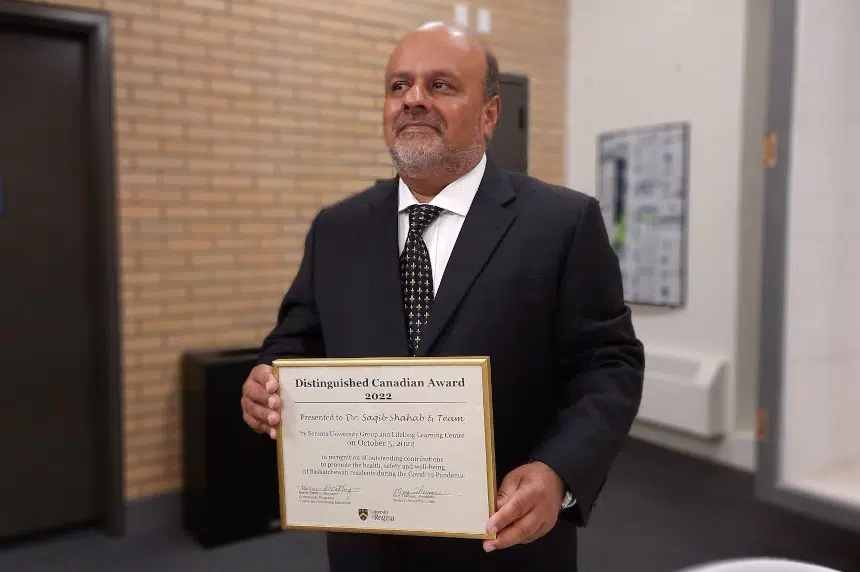As Dr. Saqib Shahab stood in front of a group at Darke Hall in Regina, accepting the Distinguished Canadian Award from the University of Regina for him and his team, he talked about how he didn’t feel he deserved it.
Shahab, Saskatchewan’s chief medical health officer, said he felt he was just one of many who were doing their job during the COVID-19 pandemic.
“When this whole discussion started, I thought I was going to be doing a lecture for the lifelong wellness centre in a classroom with some coffee,” Shahab said later.
“I’m really honoured but … this really goes to everyone who worked so hard. I was just one person doing my job along with so many other people.”
In his speech, Shahab talked about people who stayed on the job when many others went home at the start of the pandemic – police officers, firefighters, health-care workers, cab drivers, farmers, natural resource workers and so on.
“While many stood back and were able to do so, all these people and many more stepped forward and never did I see in the face of significant risk anyone hesitate to step forward to do their job that is essential and had to be done,” Shahab said.
As he spoke to the crowd, Shahab reached back to pandemics of the past and up to the pandemic the world is experiencing now. The doctor said he recalls the journey from March 2020 vividly – from the initial reports to sweeping public health measures to vaccines and successive waves and variants.
Early on in the pandemic, Shahab was celebrated for the calm, steady leadership he showed – and the sweater vests he sported during news conferences – but later on, a more negative faction started to build and led to threats and even protests outside his home.
On Wednesday, Shahab said people need to empathize with those who are worried or scared.
“We need to understand where people are coming from and try to really encourage people to do what’s best for them,” he said.
Shahab said the last 2 1/2 years have been very hard for lots of people.
“I would continue to empathize with people who found things very difficult and I think we need to continue to support each other as we continue to work our way out of this pandemic,” said Shahab.
The doctor also took the opportunity to look ahead. The province is in the midst of a seventh wave right now, seeing cases and transmission going up, but Shahab said the province needs to respond where we are now.
Shahab talked about current levels of immunity – between vaccinations and natural immunity through infection, it’s relatively high in our population. He pointed out this is a different space than the province was in early in 2020.
He took the opportunity to tout the new bivalent vaccine, which protects against the original COVID virus and the Omicron strain.
“I think we should all use our own toolkit and protect ourselves and protect others as we navigate our way through the fall,” said Shahab, mentioning he got the bivalent as soon as he was able and encouraging others to do the same.
The uptake for the new vaccine doesn’t appear to have been quick, with the province extending eligibility from those 70 and older all the way to anyone 18 and older.
Shahab said he wanted to give people the benefit of doubt that they might be waiting for the Pfizer version or waiting to get it at the same time as their flu shot.
“I think all these decisions are fine. The important thing is to go and get your flu shot and whatever bivalent vaccine you choose,” said Shahab.
In his speech, Shahab said that respiratory viruses could be up this season, pointing out that Australia – which gets its flu season ahead of North America – saw an earlier and more severe flu season.
As for what the future brings, Shahab said it’s hard to predict. He said we’ll likely keep seeing variants that are more contagious and less severe, but he doesn’t know whether it will turn into something which pops up every year like influenza.
The doctor talked about misinformation and how it spread, the need to follow science as it changes, and to make hard policy choices and act transparently with the knowledge we have.











